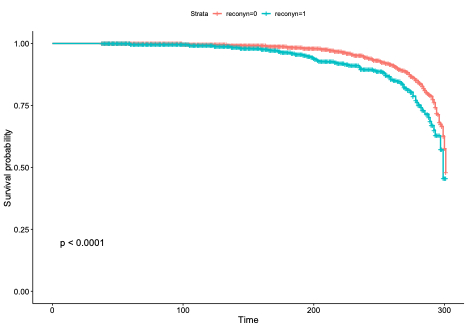Propensity Score Matched Analysis of Recurrence-Free Survival and Mortality in Post-mastectomy Patients with and without Immediate Breast Reconstruction: Our Multi-Decade, Multi-Institutional Experience
Yunchan Chen1, Tara Chadab*1, Paul A. Asadourian2, Grant G. Black1, Christine Rohde2, David Otterburn1
1Weill Cornell Medicine, New York, NY; 2Columbia University Irving Medical Center, New York, NY
Post-mastectomy reconstruction has become the standard of care for breast cancer patients. Previous studies have reported disparities in healthcare outcomes among various racial and sociodemographic groups, which may be attributed to variances in medical service accessibility, physician education patterns, and patient awareness of reconstructive options. The effect of breast reconstruction on cancer-recurrence and fatalities remains ambiguous. Our objective was to examine how patient-specific factors and reconstruction status influence recurrence-free survival and mortality rates.
Retrospective review identified post-mastectomy patients at NYP-Cornell and Columbia between 1979 and 2019. Patients were propensity score matched (1:1 nearest neighbor) based on age, race, marital status, smoking history, cancer staging, ER/PR/HER2 status, as well as treatment course (i.e., radiation, chemotherapy, immunotherapy, and hormone therapy). Cox proportional hazards model and log rank test were used for recurrence-free survival analysis. Logistic regression was used to evaluate predictors of mortality.
We found 2385 pairs of matched patients who did and did not undergo post-mastectomy breast reconstruction. Reconstruction was correlated with a significantly lower risk of recurrence and mortality compared to mastectomy without reconstruction (p<0.05). For patients who had relapsed disease, completion of the reconstruction sequence was correlated with an earlier detection of cancer recurrence (p < 0.05).
Patients who complete breast reconstruction may have better access to follow-up care, medical imaging and screening, and more opportunities for physician interface, which can lead to the earlier detection and treatment of cancer recurrence. However, patients who do not undergo reconstruction may have higher mortality rates due to factors such as delayed detection and treatment. This study may underscore the need for continued surveillance of patients who undergo mastectomy without reconstruction.
Back to 2023 Abstracts


